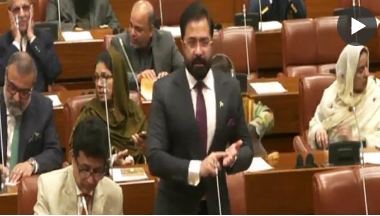ISLAMABAD, NOV 10 – The Senate session to deliberate on the parliamentary committees’ report on the 27th Amendment Constitutional Bill has begun with Presiding Officer Manzoor Ahmed in the chair.
Last week, the federal government presented a bill of the 27th Constitutional Amendment — proposing sweeping changes to the country’s judicial system as well as the military command structure — in the Senate amid protest by the opposition parties.
The establishment of the federal constitutional court and granting permanent immunity to the president, as well as lifetime status to the field marshal rank, are among the key features of the bill.
The Senate Secretariat has issued the orders of the day for November 10, which includes the key legislative business.
After the recitation, Senator Farooq H Naek, Chairman Standing Committee on Law and Justice, will present the report of the committee on the Bill further to amend the Constitution of the Islamic Republic of Pakistan [The Constitution (27th Amendment) Bill, 2025].
Agenda items 44 and 45 pertain to moving the constitutional amendment bill, as reported by the House standing committee concerned, for taking up for consideration at once and passage. Law and Justice Minister Azam Nazeer Tarar will move the bill for consideration and passage.
Meanwhile, Defence Minister Khawaja Muhammad Asif on Monday expressed confidence that the government had the required numbers in the upper house to pass the 27th Constitutional Amendment Bill.
Speaking to the media outside the Parliament, the minister said that voting on the bill required the presence of members in the House.
“God willing, the 27th Amendment will be passed by the Senate today,” he added.
Opposition vows to block 27th Amendment bill
The opposition parties in the Senate on Monday vowed to resist the government’s efforts to pass the 27th Constitutional Amendment Bill and announced staging a strong protest during today’s session.
Talking to the media following a meeting of the opposition’s parliamentary group, PTI Senator Ali Zafar said that the opposition would make every effort to ensure the government fails to pass the amendment today.
He said the opposition had been opposing the bill ever since PPP chairman Bilawal Bhutto-Zardari tweeted about it.
“We will protest strongly,” Zafar asserted, adding that the opposition would see whether the government truly had the numbers to pass the bill in the upper house.
While commenting on the controversial provision in the proposed 27th Amendment that grants immunity to certain officeholders, Zafar said the opposition firmly rejected the clause.
“We are against any form of exemption… whoever commits a crime, be it the president or a governor, must face punishment. No one should escape accountability simply because of their position,” he added.
“If someone has committed a crime, they should be punished. That is both an Islamic principle and the command of religion,” Zafar continued.
Talking to the media after the meeting a day earlier, Senator Farooq H Naek said that the 27th Amendment draft had been approved, adding that “some adjustments were made following the incorporation of fresh suggestions during the meeting.”
Senator Naek said the basic draft of the amendment has been approved, adding that “some changes have been incorporated”, while the committee has authorised him and Law Minister Azam Nazeer Tarar to finalise the remaining amendments.
The meeting, chaired by Senator Naek and MNA Mehmood Bashir Virk, was attended by Senator Tahir Khalil Sindhu, Senator Hidayatullah, Senator Shahadat Awan, Senator Zamir Hussain Ghumro, Ali Haider Gillani, Saira Afzal Tarar, Bilal Azhar Kayani, Syed Naveed Qamar and Abrar Shah. Law Secretary Raja Naeem Akbar and senior officials from the Ministry of Law and Justice also participated.
The opposition parties boycotted the meeting. Members belonging to the PTI, JUIF, Pakhtunkhwa Milli Awami Party (PkMAP) and Majlis Wahdat-e-Muslimeen (MWM) did not attend.
The committee members expressed regret over the boycott, saying that the opposition should have taken part in such an important constitutional process instead of distancing itself from it.
Sources said the Awami National Party (ANP) expressed reservations about the draft. Its proposal to rename Khyber Pakhtunkhwa was deferred after the government sought more time for consultations.
Similarly, the proposal by the Balochistan Awami Party (BAP) for increasing provincial assembly seats was also postponed for further consideration.
Both matters are expected to be finalised after additional discussions on Monday.
The committee also approved amendments to Article 243 of the Constitution following detailed deliberations and endorsed the clause establishing constitutional courts.
Furthermore, the committee approved an amendment extending the period for adjudication of pending cases from six months to one year. Under the new provision, any case not pursued for a year will be deemed disposed of.
The Awami National Party (ANP) raised objections to the 27th Constitutional Amendment and declined to attend the prime minister’s dinner, it was learnt.
Currently, Article 243 of the Constitution entrusts the President of Pakistan with the supreme command of the armed forces, while stipulating that their control and command shall rest with the federal government.
Salient features of 27th Constitutional Amendment
- A new position, Chief of Defence Forces, to be created as head of the armed forces effective from November 27, 2025
- Chief of Army Staff to assume role as Chief of Defence Forces
- Field Marshal, Marshal of Air Force, Admiral of Fleet titles to remain for life
- The prime minister will appoint the commander of the National Strategic Command from the Pakistan Army on the recommendation of the Chief of Defence Forces
- Federal Constitutional Court to be established
- Equal provincial representation proposed in the Federal Constitutional Court
- President and prime minister to play a key role in judicial appointments
- Parliament to decide the number of judges in the Federal Constitutional Court
- Supreme Court powers to be reduced, with some authorities shifted to the new court
- Term of Federal Constitutional Court chief justice to be limited to three years
- Immunity to president from criminal proceedings for life

















